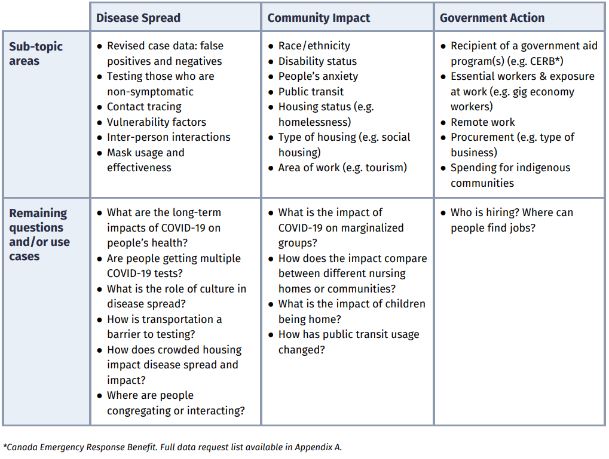What is the role of open data in the response and recovery from the COVID-19 pandemic? What datasets, data use cases, and data sharing practices should be promoted to scale our collective action?
On July 2nd, Open North and the Standards Council of Canada hosted a public consultation to discuss the role of open data during the pandemic and how we can improve our practices to mitigate disease spread, understand the impact on our communities, and evaluate government actions. In this brief, Open North aims to move the conversation forward and improve data access and sharing by identifying the top data challenges for data practitioners in Canada.
The 3 Main Challenges Facing Data Users During COVID-19
The Open COVID-19 Data consultation was hosted online, with opening remarks from the keynote speaker and Chief Statistician of Canada, Mr. Anil Arora, and four additional guest speakers. This was followed by small group discussions that provided opportunities for participants to identify available and desired data sets. Those who registered for the consultation also had the opportunity to fill in a pre-event survey identifying their data needs (receiving 40 responses). The findings reported in this brief summarize the contributions from participants during the small group discussions as well as the survey responses.
Challenge #1: Participants want more open data and they want to know when it’s available
There is a clear demand for greater data availability and, according to participants, there is still a lot of data that could be opened and shared. This is evidenced by over 200 contributions participants added to our collaborative whiteboard platform during the consultation (see table 1).
The dataset requests varied substantially. Participants requested more data on remote working conditions, people’s perspectives on how we should design our urban spaces, as well as requests for data on testing locations. In our analysis, we found 44 unique dataset requests (list available in Appendix A). We list a sample of the datasets in Table 2 as well as some of the remaining questions that participants want to answer with opened up data.
Table 1: Participants posted over 200 contributions to our collaborative whiteboard

The most frequently referenced was demographic data related to all aspects of the COVID-19 disease spread and impact. This data is available in other countries, such as the U.S., and has allowed the public to more effectively evaluate the impact of COVID-19 on certain marginalized communities. Other social and demographic data were also highly sought after, namely people’s movement, housing, and employment status.
Table 2: A sample of the wide range of datasets participants requested be opened up

Challenge #2: Long-standing barriers to open data use are exacerbated by the pandemic
Participants emphasized the need for better interoperability, data released at lower spatial resolutions, and higher quality data. Their needs are outlined in Table 3.
Interoperability is the ability to integrate multiple datasets, allowing users to join data. Releasing data representing localized areas, or at lower spatial resolutions, helps understand the local situation and is more useful for research. Inconsistent data quality also makes it difficult for participants to trust released data and information and use it for research and decision-making.
“[We] need to agree on common identifiers to allow data linkages across datasets for the same individual.”
– Mr. Mark Leggott, Guest Speaker and Executive Director of Research Data Canada
Challenge #3: It’s confusing to access open data, especially in Canada
In many cases, stakeholders were confused about what data was available and how to access it. To mitigate this confusion, participants suggested that:
- The data should be accessible from one source, such as Canada’s open data portal;
- There should be an ecosystem map of where data is already available;
- Data providers should pre-link data to facilitate its use; and
- Data providers should organize data in a format that makes it easy for people to use in the analysis.
Next Steps
Open North’s Open COVID-19 Data consultation highlighted three challenges in open data access and use, moving from discussion into identifying key action areas. It is crucial that governments provide this data and give communities the opportunity to better understand COVID-19’s causes and impacts.
To learn more about our findings, view the report below.